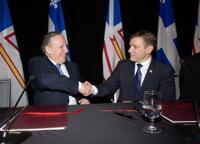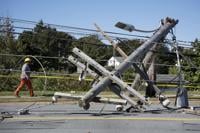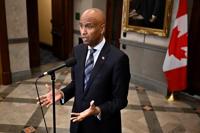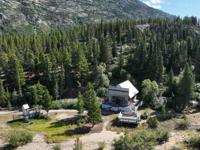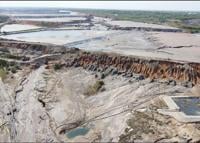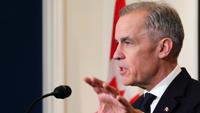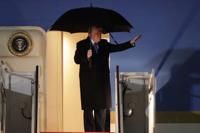ST. JOHN'S, N.L. - Two former premiers of Newfoundland and Labrador say a draft energy agreement signed Thursday with Quebec shattered a political standoff that leaders had been trying to end for decades.
Brian Tobin, a Liberal premier from 1996 to 2000, said the shift in political alignment will be good for the provinces, and for the entire country.
"I think it is a long-awaited breaking of a gridlock in the relationship between Newfoundland and Labrador and Quebec," he said in an interview Friday. "I think that this is really important."
The tensions stem from a contract signed by the two provinces in 1969, which allowed Quebec to buy hydroelectric power from the Churchill Falls plant in Labrador for just 0.2 cents per kilowatt hour. The contract was set to expire in 2041, and there was no allowance for the price to change with the market.Â
On Thursday, Newfoundland and Labrador Liberal Premier Andrew Furey literally tore up a copy of that contract as he sat beside Quebec Premier François Legault in St. John's, N.L.
They inked a new agreement in principle stipulating that Quebec will pay more, beginning with one cent per kilowatt hour in 2025, and increasing in subsequent years. The province will also shell out an average of $1 billion a year until 2041, with increases to follow, and pay a $3.5-billion fee to partner on new energy projects in the Churchill River.
Ultimately, Quebec will pay an average of 5.9 cents per kilowatt hour for energy from all Labrador sources over the 50-year contract. The deal comes with stipulations that prices can change along with the market, officials said Thursday.
Tobin dismissed questions about whether one cent per kilowatt hour in the first year was enough of an improvement. He pointed to Newfoundland and Labrador's past unsuccessful attempts to challenge the 1969 deal in court, including in the Supreme Court of Canada.
Under those rulings, Quebec has a legal right to continue paying next to nothing for Churchill Falls energy until 2041, Tobin said. Instead, after decades of bickering, they've chosen to turn the page.
"One of the things that's important in this agreement is that it was not done with Newfoundland and Labrador's back to the wall," he said. "Many other premiers, myself included, tried to address this issue. In my case, there was still 42 or 43 years left in the agreement. So not much incentive for Quebec to become too creative in trying to address our needs."
But Quebec needs energy, and new power projects take at least 10 years to build, so it was time for the province to act, he said.
Former Newfoundland and Labrador Liberal premier Roger Grimes was also impressed by the end of the deal that has haunted the province since it was signed in 1969.
"Every premier since then wished that they had found a partner in Quebec, like Premier Legault, who was willing to give some redress for (Churchill Falls)," said Grimes, who governed from 2001 to 2003. "And Premier Furey did. And thank God that he seized the moment."
The 1969 contract isn't the only hydroelectric black eye in Newfoundland and Labrador's past. The province is still deep in debt because of the Muskrat Falls development, which is also on the Churchill River. The project was approved in 2012 with a price tag of about $7.4 billion, but by the time it was finally commissioned last year after years of delay, the price had nearly doubled.
Grimes said the agreement signed Thursday not only rights the wrongs of 1969, but it reflects lessons learned from Muskrat Falls. Under the deal, Quebec will manage the construction of the two new projects and it will absorb all cost overruns while Newfoundland and Labrador will be the majority owner, he said.
The Progressive Conservative government under Danny Williams pushed for Muskrat Falls, and Grimes believes Williams was driven by an anger toward Quebec and a need to prove that Newfoundland and Labrador didn't need them.
Now, after Thursday's agreement, the two provinces are willing partners, in an arrangement that benefits them both, he said.
This report by ºÚÁϳԹÏÍø was first published Dec. 13, 2024.


